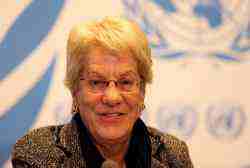
Geneva, 18 February 2013 — In its latest report, released today, the UN commission of inquiry finds that both pro- and anti-Government forces have become increasingly violent and reckless with human life as the conflict draws to the close of its second year. It emphasizes the urgent need for parties to the conflict to commit to a political settlement to end the violence.
Although the Government has yet to allow the commission to undertake investigations inside Syria, the 445 interviews conducted in this reporting period expose the human cost of a progressively radicalized and militarized conflict. Large parts of Syria are scenes of continuous combat, involving more brutal tactics and new military capabilities on all sides. The war has taken on sectarian overtones, permeated by opportunistic criminality, and aggravated by the presence of foreign fighters and extremist groups. A humanitarian disaster has resulted, with tens of thousands killed, and millions internally displaced. According to the latest UN figures, over 820,000 Syrians have sought refuge in neighbouring countries.
 Government forces and anti-Government armed groups have perpetrated massacres of civilians and hors de combat fighters. Across Syria, during house searches and at checkpoints, Government forces and affiliated militias have arbitrarily arrested individuals. At these locations – and in official and unofficial detention centres – murder, torture, rape, enforced disappearance and other inhumane acts have taken place. Committed as part of a widespread and systematic attack, they may constitute crimes against humanity.
Government forces and anti-Government armed groups have perpetrated massacres of civilians and hors de combat fighters. Across Syria, during house searches and at checkpoints, Government forces and affiliated militias have arbitrarily arrested individuals. At these locations – and in official and unofficial detention centres – murder, torture, rape, enforced disappearance and other inhumane acts have taken place. Committed as part of a widespread and systematic attack, they may constitute crimes against humanity.
The Government’s “contraction strategy” has seen urban areas in which anti-Government armed groups are present come under sustained and concerted attack. Defector accounts indicate that no distinction is being made between civilians and fighters. A disturbing pattern of aerial attacks targeting hospitals, bakeries and bread lines has emerged. Twelve instances were documented in which Government jets bombarded bread lines, often when hundreds of civilians had queued for bread following a protracted shortage. Such attacks result in considerable civilian deaths and contributed to the dire humanitarian situation of civilians. The razing of entire neighbourhoods by Government forces has also been documented.
As anti-Government armed groups gained control over territory, the commission finds that they committed murder, torture, arbitrary arrest and hostage-taking, all of which may constitute war crimes. Car and suicide bombings, directed at non-military targets, by armed groups spread terror among the civilian population. Anti-Government armed groups continue to conduct their operations from within densely populated towns and villages, endangering remaining civilians. The number of foreign fighters has grown, though they remain a small proportion of the armed groups’ ranks. Government forces, affiliated militias and anti-Government armed groups have violated the rights of children. Incidents of children being killed, tortured and raped by pro-Government forces were recorded. Children under the age of 15 have actively participated – including as fighters – in hostilities as part of some of the anti-Government armed groups.
While no distinction is to be made in respect of the gravity of the violations and abuses by pro- and anti-Government forces, the commission notes that the scale of the violations committed by the Government forces and affiliated militia significantly exceeds those of the anti-Government armed groups.
The responsibility for holding the perpetrators of war crimes and crimes against humanity accountable lies with the Government of the Syrian Arab Republic, the UN Security Council, and other influential states. There is a need to act urgently to ensure that there is justice for the crimes committed. By collecting first-hand information and documenting incidents, the commission is laying the foundation for accountability, whether at the national, regional or international levels. In March 2013, a confidential list of individuals and units believed to be responsible for crimes will be submitted to the United Nations High Commissioner for Human Rights.



